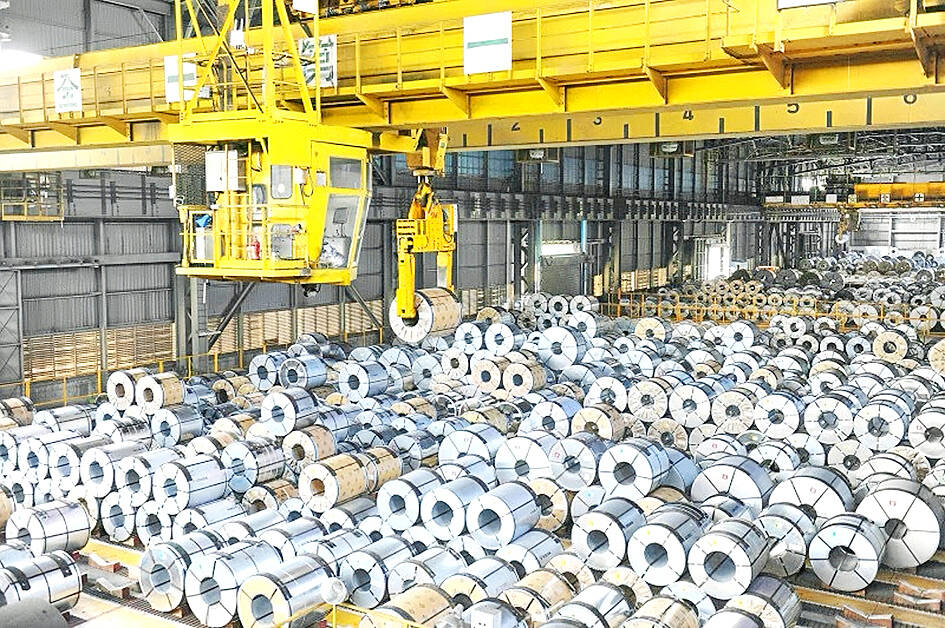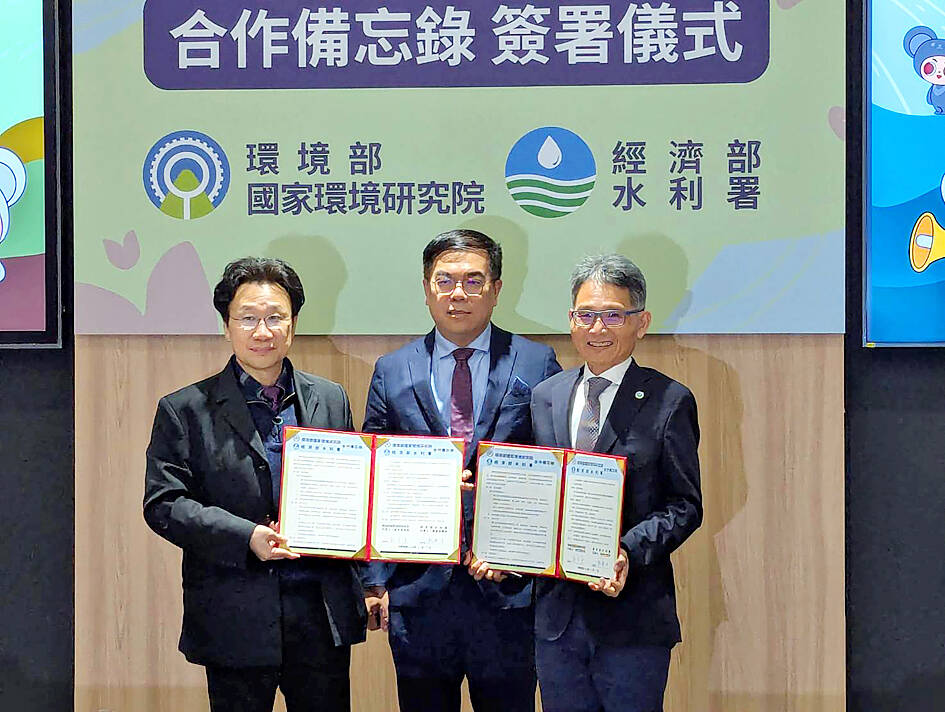A bill to establish Taiwan’s carbon border adjustment mechanism (CBAM) would be formulated in the second half of this year at the earliest, Minister of Environment Peng Chi-ming (彭啟明) said yesterday as new carbon tariffs are to be imposed under the EU’s CBAM next year.
The EU has said that mandatory carbon tariffs would be applied to carbon-intensive products imported into its territory, such as steel, cement and aluminum, with official guidelines to be issued by July or August.
Peng said he has taken up the EU’s invitation to become one of its international CBAM consultants and would continue to observe the latest developments.

Photo courtesy of China Steel Corp
Taiwan’s CBAM could be proposed in the second half of this year at the earliest in line with the EU’s official documents upon their release, he said.
Given that US President Donald Trump is introducing new tariff policies targeting different importing countries, how the EU’s CBAM responds to US tariff schemes remains uncertain, Peng said.
As CBAM is a complicated trade process that is regulated by the WTO, Taiwan would have to apply to the WTO for approval for its own version, he said.

Photo: Chen Chia-yi, Taipei Times
Domestic steel and cement manufacturers have complained to the Ministry of Environment that major competing importers are not required to disclose their carbon emissions, Peng said, adding that the ministry is compiling a list of importers — most of which are steel or cement manufacturers — to be regulated along with agencies in charge of international trade and customs affairs.
In line with the carbon fees implemented for domestic manufacturers from this year, the ministry would next set up a scheme requiring importers to disclose carbon footprints and emissions based on the EU’s regulations, he said.
For example, Taiwan imports about one-third of its cement from Vietnam, which would definitely be subject to CBAM regulations, he said.
Such measures must be introduced to protect domestic manufacturers, he said.
Meanwhile, the National Environmental Research Academy and the Water Resources Agency yesterday announced plans to make the Tamsui River (淡水河) clean enough to swim in.
“The goal is for people to swim in the river someday, just like the Seine in Paris,” Peng said at an event marking a signing of a memorandum of understanding on the “Transparent Tamsui River” imitative.
In the next few months, the project is to launch an online platform to help the public learn about the pollution status of the river, he said.
The Tamsui River is Taiwan’s most iconic river, and has been allocated the most money for cleaning and rehabilitation, he said.
Monitoring stations along the river can help identify pollution sources and help officials take necessary steps to reduce it, Water Resources Agency Director-General Lai Chien-hsin (賴建信) said.
Climate change affects seawater and the amount of water flowing through the Tamsui River to the sea, Lai said.
Starting this year, the agencies are to launch a new study on the effects of climate change on water volume and how heavily polluted water plays a role in these dynamics, he said.
Proactive water management is necessary as climate change has caused severe changes in water systems, National Environmental Research Academy Director Liu Tsung-yung (劉宗勇) said.
Through scientific research, these efforts can be bolstered, such as through cooperation between the National Environmental Research Academy and the Water Resources Agency on climate change, pollution prevention and water planning, he said.
Additional reporting by CNA

A strong continental cold air mass is to bring pollutants to Taiwan from tomorrow, the Ministry of Environment said today, as it issued an “orange” air quality alert for most of the country. All of Taiwan except for Hualien and Taitung counties is to be under an “orange” air quality alert tomorrow, indicating air quality that is unhealthy for sensitive groups. In China, areas from Shandong to Shanghai have been enveloped in haze since Saturday, the ministry said in a news release. Yesterday, hourly concentrations of PM2.5 in these areas ranged from 65 to 160 micrograms per cubic meter (mg/m³), and pollutants were

Taiwan’s armed forces have established response protocols for a wide range of sudden contingencies, including the “Wan Chun Plan” to protect the head of state, the Ministry of Defense (MND) said today. After US President Donald Trump on Saturday launched a series of airstrikes in Venezuela and kidnapped Venezuelan President Nicolas Maduro, concerns have been raised as to whether China would launch a similar “decapitation strike” on Taiwan. The armed forces regularly coordinate with relevant agencies and practice drills to ensure preparedness for a wide range of scenarios, Vice Minister of National Defense Hsu Szu-chien (徐斯儉) told reporters before a

EVA Airways on Saturday said that it had suspended a pilot and opened an investigation after he allegedly lost his temper and punched the first officer several times as their plane was taxiing before takeoff at Los Angeles International Airport. According to a report published on Thursday by The Reporter, the incident occurred after the flight’s Malaysian first officer tried to warn the Taiwanese pilot, surnamed Wen (文), that he was taxiing faster than the speed limit of 30 knots (55.6kph). After alerting the pilot several times without response, the first officer manually applied the brakes in accordance with standard operating

NOT AN OPENING: Trump’s violation of international law does not affect China’s consideration in attacking Taiwan; Beijing lacks capability, not precedent, an official said Taiwanese officials see the US’ capture of the president of Venezuela as a powerful deterrent to Beijing’s aggression and a timely reminder of the US’ ability to defeat militaries equipped with Chinese-made weapons. The strikes that toppled Venezuelan President Nicolas Maduro signaled to authoritarian leaders, including Chinese President Xi Jinping (習近平), US President Donald Trump’s willingness to use military might for international affairs core to US interests, one senior official in Taipei’s security circle said. That reassured Taiwan, the person said. Taipei has also dismissed the idea that Trump’s apparent violation of international law could embolden Beijing, said the official, who was not